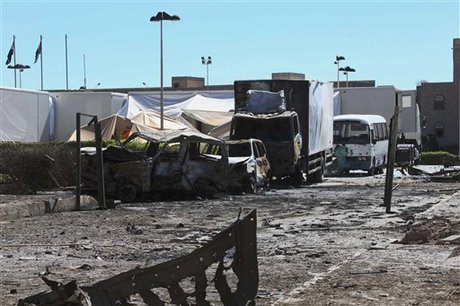Shiite Rebels Battle Loyalist Tribes Near Yemen Capital
إقرأ هذا الخبر بالعربية
Shiite rebels battled pro-government tribes and Sunni Islamists close to the Yemeni capital through the night before a fragile truce was restored on Thursday, tribal sources said.
The rebels have been pushing out from their stronghold in the mountains of the far north to other Zaidi Shiite majority areas nearer the capital in a bid to expand their hoped-for autonomous unit in a promised federal Yemen.
But they have met resistance from Zaidi tribes loyal to the historic leading family of the huge Hashid confederation and their Sunni Islamist allies in the Islah party.
The fighting erupted late Wednesday in the Arhab district -- just 35 kilometers (20 miles) north of the capital and close to Sanaa international airport -- shattering a fledgling truce, a tribal chief said.
The tribal chief accused the rebels of starting the fighting, breaking the truce agreed after they made major advances, overrunning the home base of the Al-Ahmar clan, the Hashid's increasingly contested leading family, at the weekend.
But the rebels, known as Huthis from the name of their leading family, or Ansarullah (Partisans of God), accused Islah party militia of breaking the agreement.
"The truce that was agreed on Saturday between the Huthis and the tribes of Arhab has collapsed due to a broad offensive by the Huthis," the tribal chief said, asking not to be identified.
But in a statement on their website, the rebels accused Islah party militia of "breaching the agreement and rejecting all forms of mediation" by launching an attack on the Zu Sulaiman area north of Sanaa "with all kinds of weapons."
The rebels also accused Islah gunmen of attacking a convoy of mediators sent to the area by President Abdrabuh Mansur Hadi last week and of killing a number of their guards.
The mediators managed to broker a halt to the fighting early on Thursday and were working on cementing the truce, tribal sources said.
Saleh's hand seen in tribal split
The rebels succeeded in agreeing truces with many Hashid tribes over the past week, taking advantage of a deep rift within the confederation between its historic leader Sheikh Sadeq al-Ahmar and tribes loyal to ousted president Ali Abdullah Saleh.
The Al-Ahmar sided with the Arab Spring protests that forced Saleh to step down in February 2012 after 33 years in power.
The UN Security Council has been mulling sanctions against Saleh regime figures suspected of undermining the UN-backed transition, diplomats at the United Nations said late last month.
The Huthis rose up against Saleh's government in 2004 and have fought an on-off conflict in the far north ever since. The ousted strongman now stands accused of throwing his support behind the rebels.
Hadi, who replaced Saleh under the UN-backed transition deal, has pledged that Yemen will adopt a federal constitution in a bid to address regional grievances that have fuelled violence across the Arab world's poorest country.
But at a ceremony last month to mark the conclusion of a troubled 10-month national dialogue, he put off any decision on the thorny issue of how many component units the federation will have, leaving it to a special commission to decide.



